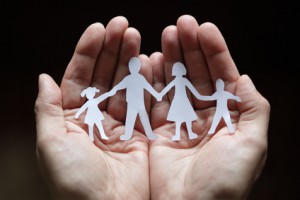The Gift of Freedom is Wrapped in Safety
I wanted to present this information with a creative flare. Maybe an inspiring story, a personal experience, or an insightful saying would provide the creative boost I wanted. But, I just couldn’t come up with anything. So, I am just have to say it straight out. I have to stick with the direct approach. Here it is: Children need to feel safe. Feeling safe opens the door to healthy development. Specifically, our children need to feel safe in order to:
- Have the freedom to explore the world around them and learn about themselves, others, and the world.
- Have the freedom to develop into mature adults based on their unique interests and abilities.
- Have the freedom to establish healthy, loving relationships with family, friends, and other adults.
 Without a sense of safety, our children’s development in each of these areas is hindered, even delayed. The freedom to grow comes wrapped in the package of safety! Parents play a crucial role in helping children develop the sense of safety that allows for healthy development. Let me share four of the most important ways you, as parents, shape an environment that makes children feel safe. In order to create an environment in which children feel safe:
Without a sense of safety, our children’s development in each of these areas is hindered, even delayed. The freedom to grow comes wrapped in the package of safety! Parents play a crucial role in helping children develop the sense of safety that allows for healthy development. Let me share four of the most important ways you, as parents, shape an environment that makes children feel safe. In order to create an environment in which children feel safe:
- Remain consistently present in your children’s lives. Make time for your children. Remain present even when you are angry at them. Be available even when times are tough. Rejoice with them. Grieve with them. Cry with them. Play with them. Let them know, come rain or come shine, in good times and in bad, you are available and present in their lives.
- Build predictability into your family life. Predictability equals safety in your children’s mind. Morning routines, mealtime routines, homework routines, bedtime routines all add predictable structure to a family’s daily life. Rituals to recognize holidays, birthdays, and special effort or achievement also add structure and predictability to family life. These routines and rituals combine to create a safe structure in which variations and unusual circumstances can be understood and integrated. In other words, when children typically experience a loving structure in their home, they can better handle emergencies. They can more easily navigate occasional changes in routine. They can better manage unusual events. Give your children the gift of a predictable structure.
- Discipline with confidence. Children need limits to feel safe. They need to know that their misbehavior and outbursts of emotion will not overwhelm their parent. Give them the comfort of knowing a competent adult can and will enforce a limit in the face of any behavior or emotion. On the other hand, children need enough information to make sense of a limit and the related consequence. Establishing clear limits/consequences and communicating those limits/consequences in a concise manner will increase your children’s sense of safety exponentially.
- Discipline with empathy. Discipline most often occurs when children’s behavior or desires are at odds with parental decisions. Having a viewpoint that clashes with their parents’ viewpoint can raise your children’s level of anxiety. To nurture a sense of safety in the midst of these opposing views, parents discipline with empathy. Empathize with your children’s frustration, but stand firm. Listen to their reasons for wanting a change in the limit as they mature; but remember, you still have the final say. You determine the limit based on your experience and your knowledge of your children’s abilities and needs.
By establishing these four practices you increase your children sense of safety. In response, they will be better able to explore themselves and the world around them. They will mature into healthy adults. And, they will misbehave less often.